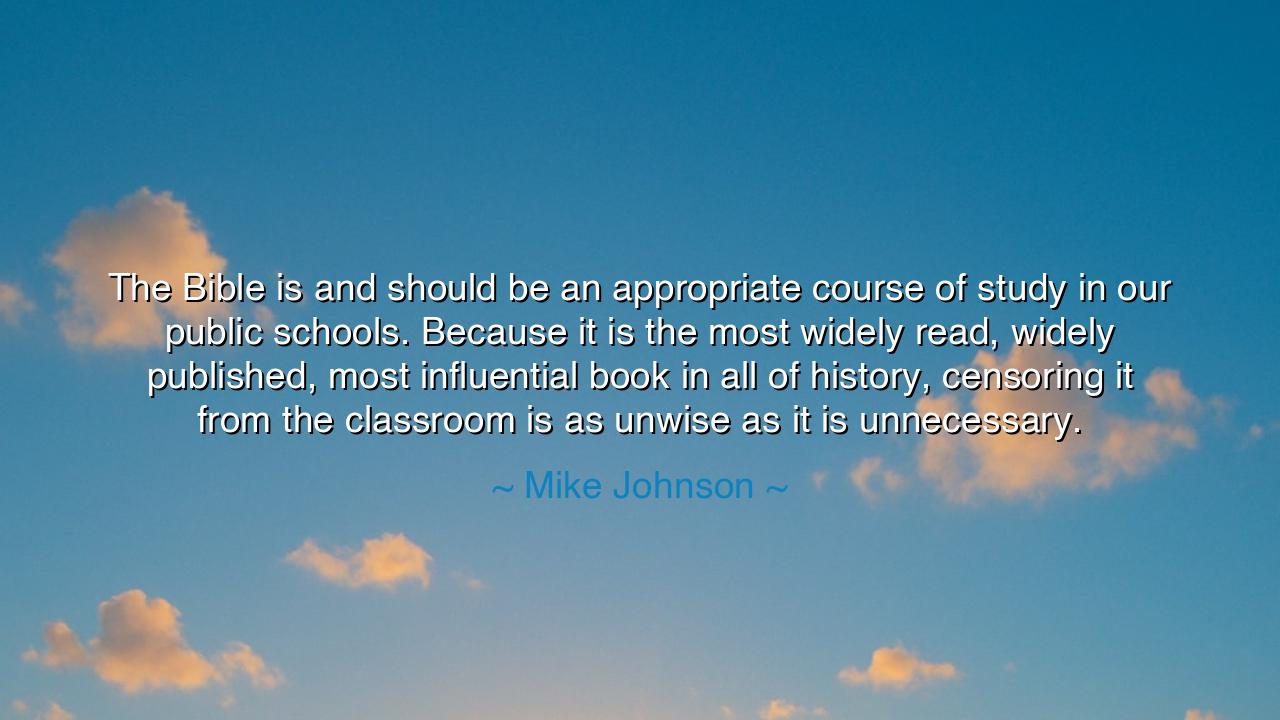
The Bible is and should be an appropriate course of study in our
The Bible is and should be an appropriate course of study in our public schools. Because it is the most widely read, widely published, most influential book in all of history, censoring it from the classroom is as unwise as it is unnecessary.






“The Bible is and should be an appropriate course of study in our public schools. Because it is the most widely read, widely published, most influential book in all of history, censoring it from the classroom is as unwise as it is unnecessary.” Thus declared Mike Johnson, a voice of conviction in a time when truth and faith are often treated as relics of the past. In these words, he does not call for dominance of religion, but for recognition of heritage, for the understanding that the story of civilization cannot be told without the Book that shaped it. His statement echoes across the centuries, like the tolling of an ancient bell, reminding the modern age that to know the past is to know ourselves—and to cast away the foundations of wisdom is to build the future on sand.
The meaning of Johnson’s words lies not in preaching doctrine, but in honoring history. The Bible, whatever one’s faith, stands as the most influential work ever written. It has inspired the laws of nations, the movements of freedom, the works of artists, the thoughts of philosophers, and the courage of reformers. Its verses have been whispered in prisons, sung in fields, and carved into the hearts of those who suffered and endured. To remove it from study is not to protect neutrality—it is to deny the root of human culture, the soil from which much of Western thought has sprung. Johnson reminds us that the danger of ignorance is not disagreement, but disconnection—a generation unmoored from the sources of meaning that shaped their civilization.
In truth, history itself bears witness to the power of sacred texts to enlighten minds rather than enslave them. Consider the Renaissance, that great rebirth of knowledge, which was born in part from scholars returning to the Bible not merely as a spiritual guide, but as a work of language, art, and ethics. Men like Erasmus of Rotterdam studied its words in Greek and Latin to rediscover the purity of wisdom that had been clouded by corruption. From those studies arose not division, but a new age of human thought. The Bible’s presence in the schools of that time did not dim reason—it sharpened it. For when one encounters the poetry of the Psalms, the moral reasoning of the prophets, or the parables of Christ, one also encounters the history of the human conscience itself.
Johnson’s declaration also carries a warning: that censorship, born from fear or pride, does not create freedom—it destroys understanding. To “censor the Bible,” as he says, is to reject not belief, but knowledge. It is to pretend that a text which shaped law, art, politics, and philosophy for millennia can be excised without consequence. The ancients taught that wisdom grows only when all voices are heard, and that the measure of a society’s maturity lies in its capacity to study without fear. When students read the Bible alongside other great works—Homer, Confucius, Shakespeare—they do not become converts; they become thinkers. They learn to see the thread that runs through all human striving: the longing for justice, mercy, meaning, and redemption.
Throughout time, the study of sacred texts has united rather than divided those who approached them with open hearts. In the American story itself, the Founding Fathers—though diverse in belief—were steeped in the language and ideas of the Bible. Concepts like liberty, equality, and moral responsibility were drawn from its well. Jefferson, though skeptical of miracles, admired the teachings of Jesus as the finest moral code ever written. Lincoln’s speeches, echoing Scripture, lifted a broken nation toward reconciliation. Thus, to understand these figures, one must understand the Book that inspired them. Johnson’s argument, then, is not for indoctrination, but illumination—for the teaching of history as it truly was, not as modern sensibilities wish it to be.
There is also, beneath Johnson’s words, a call to courageous balance—the wisdom to distinguish between learning about faith and forcing belief. In a world that swings wildly between extremes, this balance is rare. But the ancients understood it well: they knew that to study something deeply was not to submit to it blindly. Just as one may study the Quran to understand Islam, or the Analects to grasp Chinese thought, so too must one study the Bible to comprehend the moral and literary foundations of the West. Knowledge, when guided by humility, breeds neither arrogance nor fear—it breeds understanding. And from understanding comes the peace that ignorance can never achieve.
So let this be the lesson passed down: do not fear wisdom, wherever it is found. The study of sacred texts does not weaken reason—it deepens it. To know the Bible is not merely to learn religion; it is to encounter the words that shaped history, the poetry that molded the heart of humanity. To exclude it is to close one’s eyes to the light that guided countless generations through darkness. Let the youth study it not as dogma, but as heritage—not as command, but as conversation with time itself.
Thus, in the spirit of Richard Rohr’s compassion and Brunelleschi’s endurance, hear the echo of Mike Johnson’s conviction: that to understand who we are, we must not fear to look at what made us. The Bible is not a threat to education—it is one of its earliest and greatest sources. Let every school, every student, every soul learn from its wisdom—not to believe as others believe, but to see as others have seen. For in the words of the ancients, written in the dust of time, lies the eternal invitation: “Seek wisdom, and you shall find understanding.”






AAdministratorAdministrator
Welcome, honored guests. Please leave a comment, we will respond soon